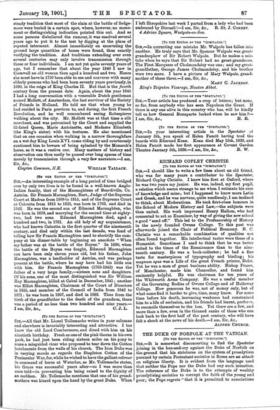[TO THE EDITOR OF THE "SPECTATOR.") Sm—An interesting example of
a long period of time bridged over by only two lives is to be found in a well-known Anglo- Indian family, that of the Macnaghtens of Be,ardiville, Co. Antrim. Sir Francis Macnaghten, Bart., Judge of the Supreme Court at Madras from 1809 to 1815, and of the Supreme Court at Calcutta from 1815 to 1825, was born in 1763, and died in 143. He was the second son of Edmond Macnaghten, who was born in 1679, and marrying for the second time at eighty- two, had two sons. Edmond Macnaghten died, aged a hundred and two, in 1781. An old lady of my acquaintance, who had known Calcutta in the first quarter of the nineteenth century, and died only within the last decade, was fond of telling how Sir Francis Macnaghten used to electrify the com- pany at his dinner-table by beginning an anecdote "When my father was at the battle of the Boyne." In 1690, when the battle of the Boyne was fought, Edmond Macnaghten can have been only eleven years old, but his father, John Macnaghten, was a landholder of Antrim, and was perhaps present at the battle, where he may have had his little son with him. Sir Francis Macnaghten (1763-1843) was the father of a very large family,—sixteen sons and daughters. Of his sons, one of the most distinguished was Sir William Hay Macnaghten, killed at Cabul in December, 1841; another was Elliot Macnaghten, Chairman of the Court of Directors in 185,5, and member of the Council of India from 1842 to 1871: he was born in. 1807, and died in 1888. Thus from the birth of the grandfather to the death of the grandson, there was a period of no less than two hundred and nine years.—






































 Previous page
Previous page